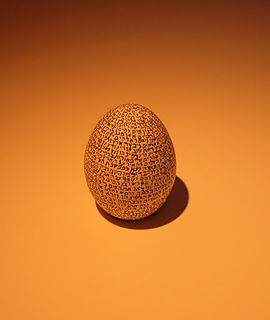 W
WBereshit, Bereishit, Bereshis, Bereishis, B'reshith, Beresh't, Beresheet, or Bereishees is the first weekly Torah portion in the annual Jewish cycle of Torah reading. The parashah consists of Genesis 1:1–6:8.
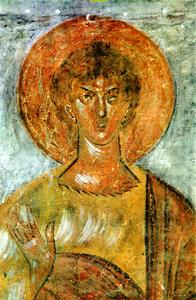 W
WAbel is a Biblical figure in the Book of Genesis within Abrahamic religions. He is the younger brother of Cain, and the younger son of Adam and Eve, the first couple within the Biblical tale. He was a shepherd who offered his firstborn flock up to God as an offering. God accepted his offering but not his brother’s. Out of jealousy Cain killed Abel.
 W
WAdam and Eve, according to the creation myth of the Abrahamic religions, were the first man and woman. They are central to the belief that humanity is in essence a single family, with everyone descended from a single pair of original ancestors. They also provide the basis for the doctrines of the fall of man and original sin that are important beliefs in Christianity, although not held in Judaism or Islam.
 W
WAllusions in rabbinic literature to the Biblical figure Adam, created according to the Book of Genesis by God in the Garden of Eden as the first man, expand and elaborate and draw inferences from what is presented in the text of the Bible itself.
 W
WAdamah is a word, translatable as ground or earth, which occurs in the Biblical account of Creation of the Book of Genesis. The etymological link between the word adamah and the word adam is used to reinforce the teleological link between humankind and the ground, emphasising both the way in which man was created to cultivate the world, and how he originated from the "dust of the ground". Because man is both made from the adamah and inhabits it, his duty to realise his own potential is linked to a corresponding duty to the earth. In Eden, the adamah has primarily positive connotations, although Adam's close relationship with the adamah has been interpreted as likening him to the serpent, which crawls upon the ground, thus emphasising his animal nature.
 W
WCain is a Biblical figure in the Book of Genesis within Abrahamic religions. He is the older brother of Abel, and the older son of Adam and Eve, the first couple within the Biblical tale. He was a farmer who gave an offering of his crops to God with which God was not pleased and favored Abel's over Cain. Out of jealousy he then killed his brother, which led to the punishment as the curse and mark of Cain. He had various offsprings starting with Enoch including Lamech. His lineage would later be wiped out after the Flood within the narrative.
 W
WIn the biblical Book of Genesis, Cain and Abel are the first two sons of Adam and Eve. Cain, the firstborn, was a farmer, and his brother Abel was a shepherd. The brothers made sacrifices to God, each of his own produce, but God favored Abel's sacrifice instead of Cain's. Cain then murdered Abel, whereupon Yahweh punished Cain by condemning him to a life of wandering. Cain then dwelt in the land of Nod, where he built a city and fathered the line of descendants beginning with Enoch.
 W
WThe curse of Cain and the mark of Cain are phrases that originated in the story of Adam and Eve in the Hebrew Bible. In the stories, if someone did something to harm Cain, the damage would come back sevenfold. Some interpretations view this as a physical mark, whereas other interpretations see the "mark" as a sign, and not as a physical mark on Cain himself. The King James Version of the Bible reads "set a mark upon Cain."
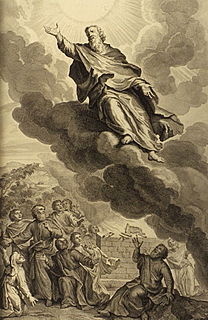 W
WEnoch is a biblical figure prior to Noah's flood and the son of Jared and father of Methuselah. He was of the Antediluvian period in the Hebrew Bible. This Enoch is not to be confused with Cain's son Enoch.
 W
WEnoch is a character in the Book of Genesis. He is described as a son of Cain, and father of Irad. After Cain arrived in the Land of Nod, to which he was evicted by the Lord as his punishment for murdering his brother Abel, his wife became pregnant and bore Cain's first child, whom he named Enoch.
 W
WEnos or Enosh is a character in the Book of Genesis in the Hebrew Bible. He is described as the first son of Seth who figures in the Generations of Adam, and is also referred to within the genealogies of 1 Chronicles.
 W
WEve is a figure in the Book of Genesis in the Hebrew Bible as well as a figure in the Quran. According to the origin story of the Abrahamic religions, she was the first woman. Eve is known also as Adam's wife.
 W
WThe fall of man, or the fall, is a term used in Christianity to describe the transition of the first man and woman from a state of innocent obedience to God to a state of guilty disobedience. The doctrine of the fall comes from a biblical interpretation of Genesis chapter 3. At first, Adam and Eve lived with God in the Garden of Eden, but the serpent tempted them into eating the fruit from the tree of knowledge of good and evil, which God had forbidden. After doing so, they became ashamed of their nakedness and God expelled them from the Garden to prevent them from eating from the tree of life and becoming immortal.
 W
WForbidden fruit is a name given to the fruit growing in the Garden of Eden which God commands mankind not to eat. In the biblical narrative, Adam and Eve eat the fruit from the tree of the knowledge of good and evil and are exiled from Eden.And the Lord God commanded the man, saying, Of every tree of the garden thou mayest freely eat: But of the tree of the knowledge of good and evil, thou shalt not eat of it: for in the day that thou eatest thereof thou shalt surely die.
 W
WThe Garden of Eden, also called the Terrestrial Paradise, or simply Paradise, is the biblical "Garden of God" described in the Book of Genesis and the Book of Ezekiel. Genesis 13:10 refers to the "garden of God", and the "trees of the garden" are mentioned in Ezekiel 31:9. The Book of Zechariah and the Book of Psalms also refer to trees and water, without explicitly mentioning Eden.
 W
WGenesis 1:1 is the first verse of the first chapter in the Book of Genesis in the Bible and the opening of the Genesis creation narrative.
 W
WGenesis 1:3 is the third verse of the first chapter in the Book of Genesis. In it, God made light by declaration. It is a part of the Torah portion known as Bereshit.
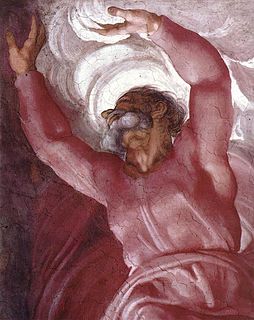 W
WGenesis 1:4 is the fourth verse of the first chapter in the Genesis. It is the response to God's command in verse 3, "Let there be light." It is part of the Genesis creation narrative within the Torah portion Bereshit. The verse states that the light was good, and that God divided or separated the light from the darkness. It has been interpreted in different ways, and illustrated by artists such as Michelangelo.
 W
WGenesis 1:5 is the fifth verse in the first chapter of the Book of Genesis, part of the Genesis creation narrative. In this verse, God names the newly created day and night. Interpretation of this passage hinges on the interpretation of Genesis 1:4. "Evening and morning" bring the narrative of the first day of Creation to a close, and there are also multiple interpretations of this phrase.
 W
WThe Genesis creation narrative is the creation myth of both Judaism and Christianity. The narrative is made up of two stories, roughly equivalent to the first two chapters of the Book of Genesis. In the first, Elohim creates the heavens and the Earth in six days, then rests on, blesses and sanctifies the seventh. In the second story, God, now referred to by the personal name Yahweh, creates Adam, the first man, from dust and places him in the Garden of Eden, where he is given dominion over the animals. Eve, the first woman, is created from Adam and as his companion.
 W
WGihon is the name of the second river mentioned in the second chapter of the biblical Book of Genesis. The Gihon is mentioned as one of four rivers issuing out of the Garden of Eden that branched from a single river within the garden.
 W
WHam, according to the Table of Nations in the Book of Genesis, was the second son of Noah and the father of Cush, Mizraim, Phut and Canaan.
 W
W"In the beginning" is an opening phrase first used in the Bible in Genesis 1:1. First referring to the beginning when the heavens and Earth were created and later commonly paralleled to Christians once again in John 1:1 as the "Word" being with God and being God during the beginning. Outside of the Bible, it is a common term in popular culture such as album titles and fiction titles.
 W
WJapheth, is one of the three sons of Noah in the Book of Genesis, in which he plays a role in the story of Noah's drunkenness and the curse of Ham, and subsequently in the Table of Nations as the ancestor of the peoples of the Aegean Sea, Anatolia, and elsewhere. In medieval and early modern European tradition he was considered to be the progenitor of the European peoples.
 W
WLamech is a person in Cain's genealogy in the fourth chapter of the Book of Genesis. He is a sixth-generation descendant of Cain ; his father was named Methushael, and he was responsible for the "Song of the Sword". He is also noted as the first polygamist mentioned in the Bible, taking two wives, Adah and Zillah (Tselah).
 W
W"Let there be light" is an English translation of the Hebrew יְהִי אוֹר found in Genesis 1:3 of the Torah, the first part of the Hebrew Bible. In Old Testament translations of the phrase, translations include the Greek phrase γενηθήτω φῶς and the Latin phrases fiat lux and lux sit.
 W
WMethuselah was a biblical patriarch and a figure in Judaism, Christianity, and Islam. Having died at the age of 969, he lived the longest of all figures mentioned in the Bible. According to the Book of Genesis, Methuselah was the son of Enoch, the father of Lamech, and the grandfather of Noah. Elsewhere in the Bible, Methuselah is mentioned in genealogies in 1st Chronicles and the Gospel of Luke.
 W
WNaamah is an individual mentioned in the Hebrew Bible, in Genesis 4:22. A descendant of Cain, she was the only mentioned daughter of Lamech and Zillah and their youngest mentioned child; her brother was Tubal-cain, while Jabal and Jubal were her half-brothers, sons of Lamech's other wife Adah.
 W
WThe Nephilim are mysterious beings or people mentioned in the Hebrew Bible. They are large and strong; the word Nephilim is loosely translated as giants in some Bibles but left untranslated in others. Some traditional Jewish explanations interpret them as fallen angels. The main reference to them is in Genesis, but the passage is ambiguous and the identity of the Nephilim is disputed.
 W
WIn the traditions of Abrahamic religions, Noah features as the tenth and last of the pre-Flood patriarchs. His story appears in the Hebrew Bible and in the Quran. The Genesis flood narrative is among the best-known stories of the Bible. Noah is also portrayed as a "tiller of the soil" and as a drinker of wine.
 W
WAllusions in rabbinic literature to the Biblical character Noah, who saved his family and representatives of all the animals from a great flood by constructing an ark, contain various expansions, elaborations and inferences beyond what is presented in the text of the Bible itself.
 W
WThe Pishon is one of four rivers mentioned in the Biblical Book of Genesis. In that passage, a source river flows out of Eden to water the Garden of Eden and from there divides into the four named rivers. The Pishon is described as encircling "the entire land of Havilah." Land of Pigmesh of Pishon River.
 W
WSerpents are referred to in both the Hebrew Bible and the New Testament. The symbol of a serpent or snake played important roles in religious and cultural life of ancient Egypt, Canaan, Mesopotamia and Greece. The serpent was a symbol of fertility. Nāḥāš, Hebrew for "snake", is also associated with divination, including the verb form meaning "to practice divination or fortune-telling". In the Hebrew Bible, Nāḥāš occurs in the Torah to identify the serpent in the Garden of Eden. Throughout the Hebrew Bible, it is also used in conjunction with seraph to describe vicious serpents in the wilderness. The tannin, a dragon monster, also occurs throughout the Hebrew Bible. In the Book of Exodus, the staffs of Moses and Aaron are turned into serpents, a nāḥāš for Moses, a tannin for Aaron.
 W
WSeth, in Judaism, Christianity, Mandaeism, Sethianism, and Islam, was the third son of Adam and Eve and brother of Cain and Abel, their only other children mentioned by name in the Hebrew Bible. According to Genesis 4:25, Seth was born after Abel's murder by Cain, and Eve believed that God had appointed him as a replacement for Abel.
 W
WShabbat, Shabbos, or the Sabbath, is Judaism's day of rest on the seventh day of the week—i.e., Saturday. On this day, religious Jews remember the biblical story describing the creation of the heavens and the earth in six days and look forward to a future Messianic Age. Since the Jewish religious calendar counts days from sunset to sunset, Shabbat begins in the evening of what on the secular calendar is Friday.
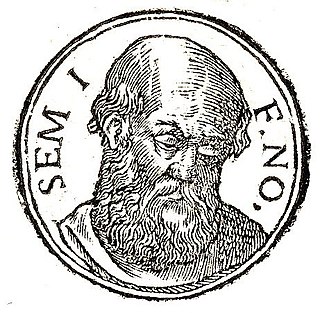 W
WShem was one of the sons of Noah in the Hebrew Bible as well as in Islamic literature.
 W
WTohu wa-bohu or Tohu va-Vohu, is a Biblical Hebrew phrase found in the Genesis creation narrative that describes the condition of the earth (eretz) immediately before the creation of light in Genesis 1:3.
 W
WThe tree of life is a term mentioned in the Hebrew Bible.
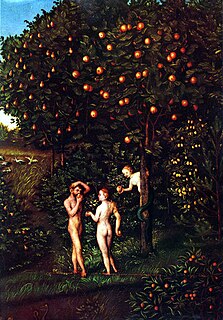 W
WThe tree of the knowledge of good and evil is one of two specific trees in the story of the Garden of Eden in Genesis 2–3, along with the tree of life.
 W
WTubal-cain or Tubalcain is a person mentioned in the Bible, in Genesis 4:22, known for being the first blacksmith. He is stated as the "forger of all instruments of bronze and iron". A descendant of Cain, he was the son of Lamech and Zillah. Tubal-cain was the brother of Naamah and half-brother of Jabal and Jubal. The Israeli kibbutz, Tuval is named after him.